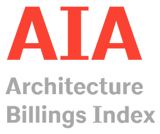AIA's ABI Survey Rebounds In April; Back In Positive Territory
 Washington, DC – Following a sizable decrease in demand for design services in March, the April Architecture Billings Index (ABI) climbed back into positive territory,
according to a new report from The American Institute of Architects (AIA).
Washington, DC – Following a sizable decrease in demand for design services in March, the April Architecture Billings Index (ABI) climbed back into positive territory,
according to a new report from The American Institute of Architects (AIA).
AIA’s ABI score for April showed a small increase in design services at 50.5, up from 47.8 in March. Any score above 50 indicates an increase in billings. Additionally, business conditions remained strong at firms located in the South. Despite
this and the positive overall billings score, most regional and sector indictors continue to display decreasing demand for design services.
“In contrast to 2018, conditions throughout the construction sector recently have become more unsettled,” said AIA Chief Economist Kermit Baker, PhD, Hon. AIA. “Though we may not be at a critical inflection point, the next several months
of billing data will be indicative of the health of the industry going into 2020.”
Key ABI highlights for April include:
• Regional averages: South (51.6); Midwest (49.3); West (49.0); Northeast (45.1)
•
Sector index breakdown: mixed practice (53.2); institutional (49.2); multi-family residential (47.4); commercial/industrial (46.6)
•
Project inquiries index: 60.9 Design contracts index: 52.1
The regional and sector categories are calculated as a three-month moving average, whereas the national index, design contracts and inquiries are monthly numbers.
About The American Institute Of Architects
 For over 150 years, members of the American Institute of Architects have worked with each other and their communities to create more valuable, healthy, secure, and sustainable buildings and cityscapes. Members adhere to a code of ethics and professional conduct to ensure the highest standards in professional practice. Embracing their responsibility to serve society, AIA members engage civic and government leaders and the public in helping find needed solutions to pressing issues facing our communities, institutions, nation and world. For more information, visit www.aia.org.
For over 150 years, members of the American Institute of Architects have worked with each other and their communities to create more valuable, healthy, secure, and sustainable buildings and cityscapes. Members adhere to a code of ethics and professional conduct to ensure the highest standards in professional practice. Embracing their responsibility to serve society, AIA members engage civic and government leaders and the public in helping find needed solutions to pressing issues facing our communities, institutions, nation and world. For more information, visit www.aia.org.